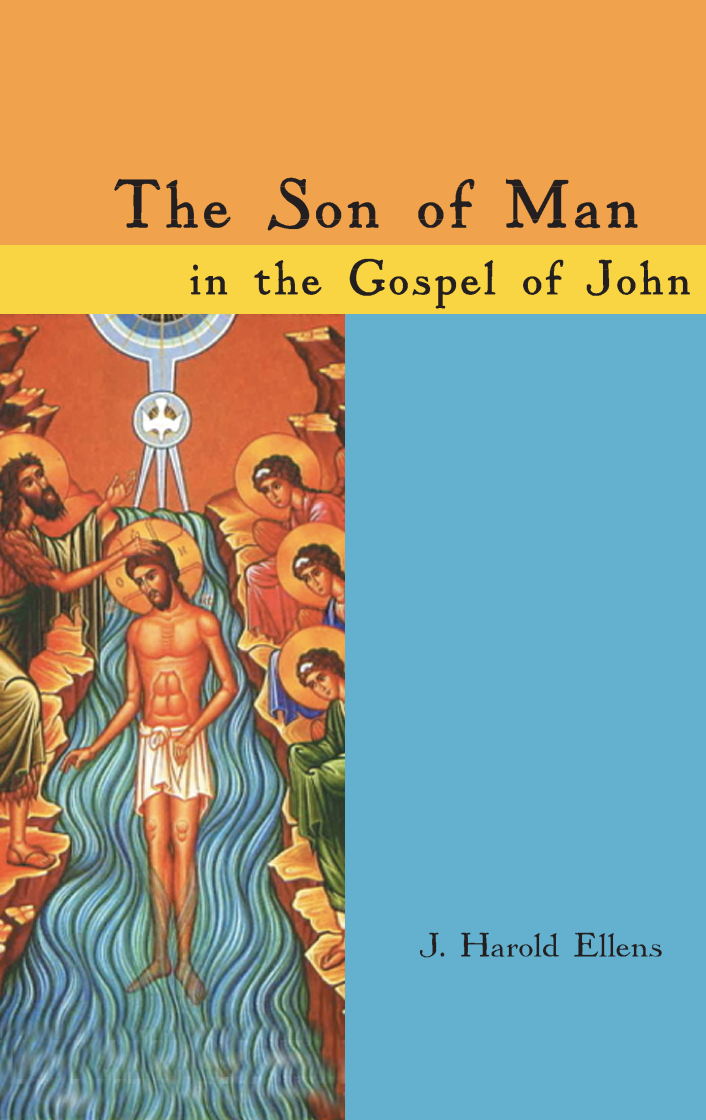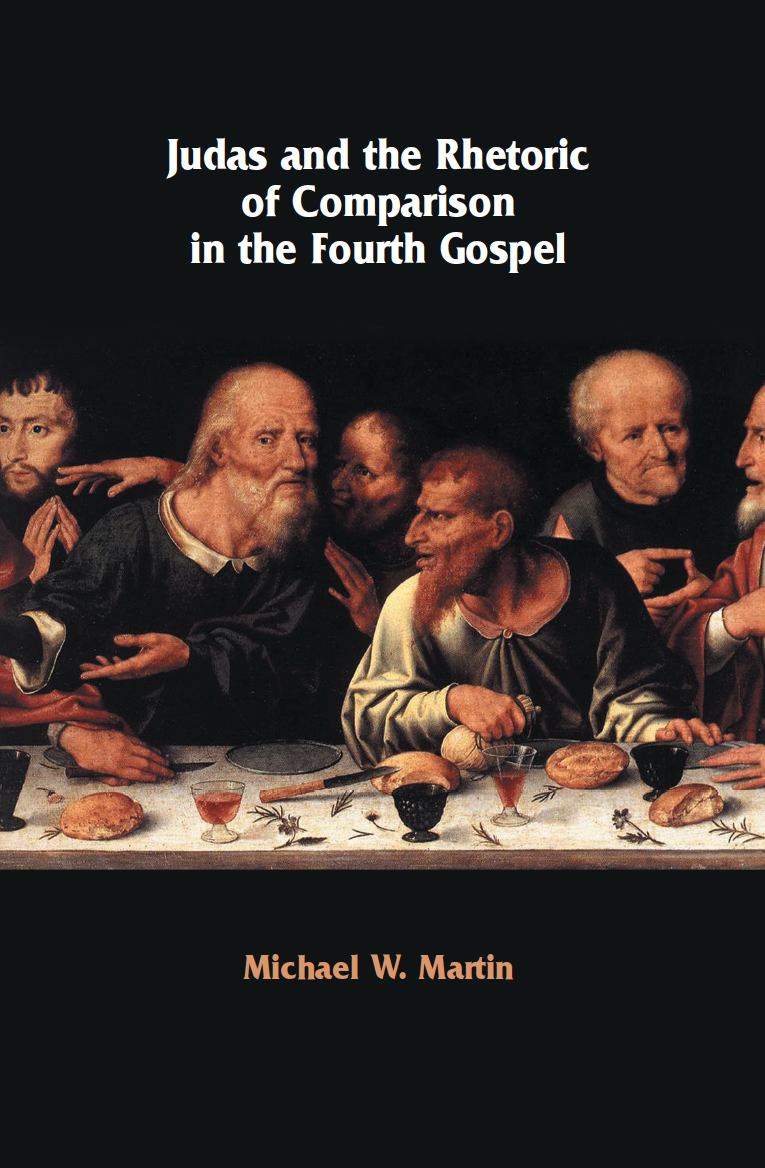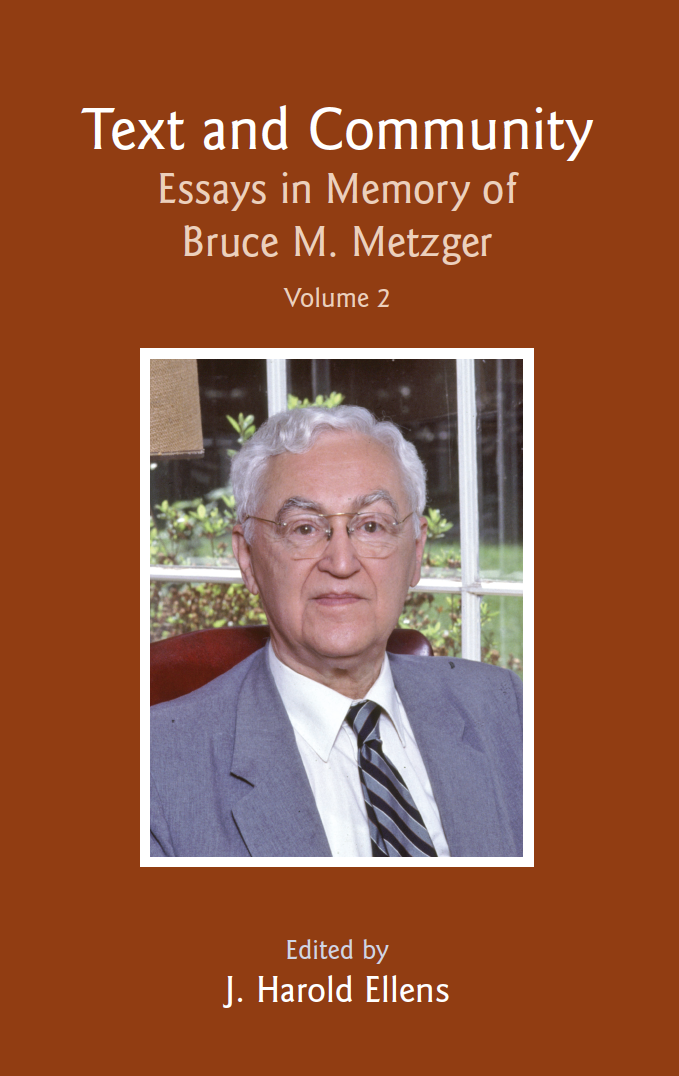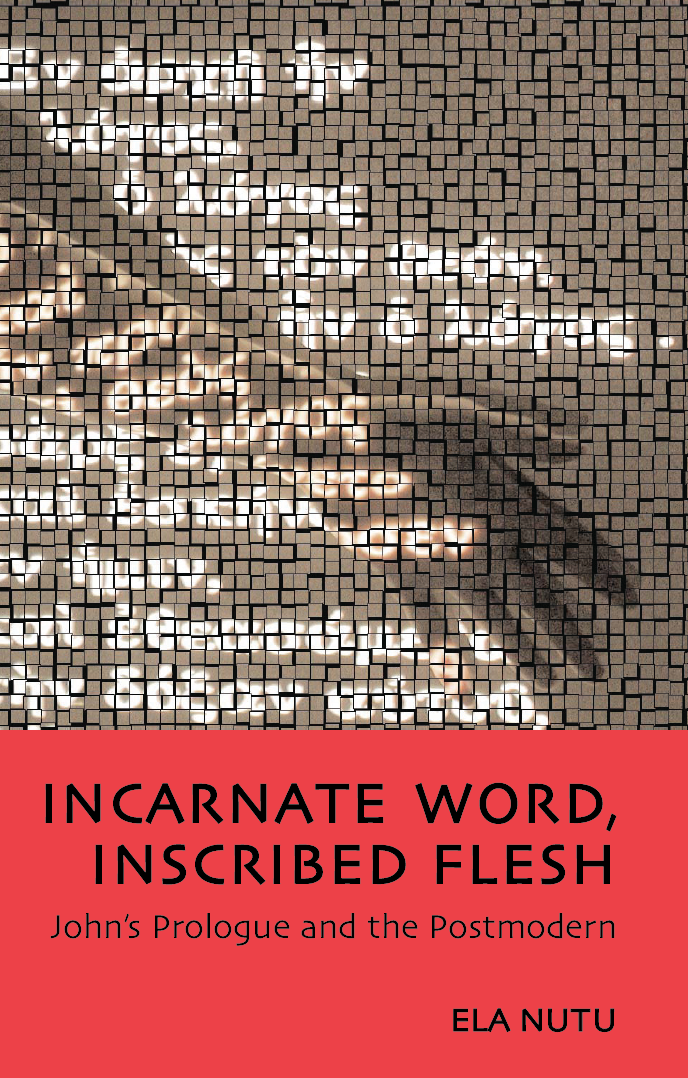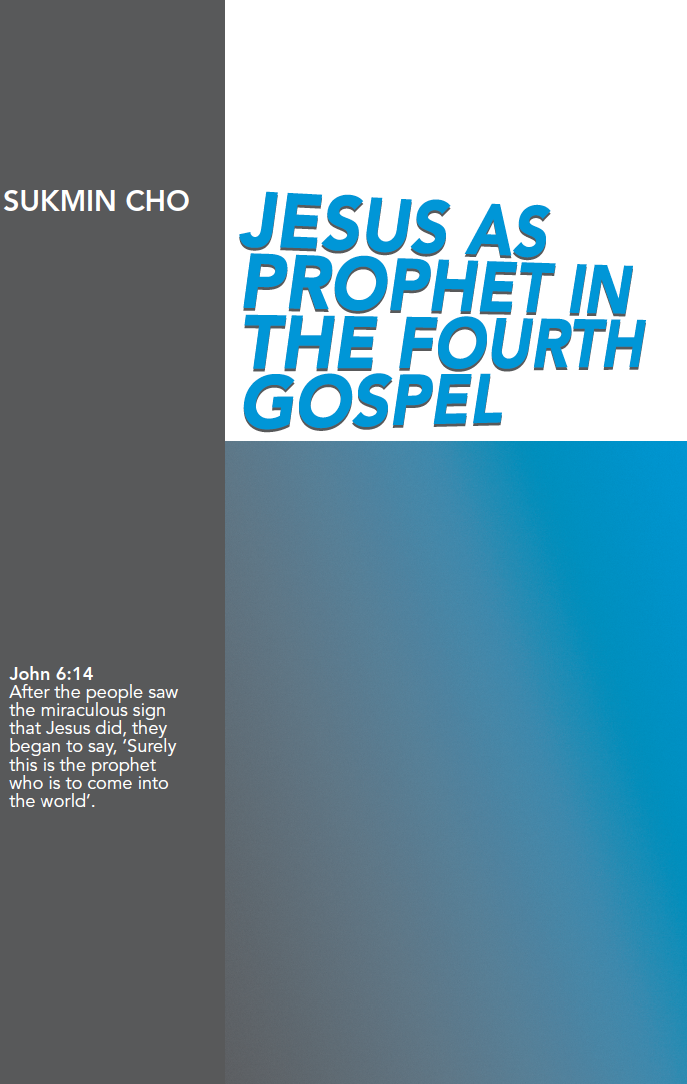Echoes of Friendship in the Gospel of John
Published: Oct 2010
£60.00
Friendship in the Graeco-Roman world took a wide variety of forms, with some 'friendships' involving nothing more than a political alliance or patron —client relationship and others involving deep personal intimacy. When Jesus says his disciples are to be called 'friends', what type of friendship does he have in mind?
Friendship may seem a relatively insignificant motif in the Gospel of John, since the author does not explicitly set out to provide a philosophical discourse on the nature of friendship, nor does he explicitly state that the narrative is about friendship. In this study, however, Culy, having carefully examined Graeco-Roman literature on friendship, demonstrates that the language of what he calls 'ideal friendship' actually pervades the Fourth Gospel from beginning to end and serves as a primary vehicle for characterizing the relationships that are introduced in the Prologue and fleshed out throughout the course of the narrative.
Taking up the friendship motif as a tool of characterization, the Gospel of John points to a striking implication of the life, death, and resurrection of Jesus: that followers of Jesus are invited to enjoy a level of intimacy with him that can actually, and perhaps only, be compared to the level of intimacy that he enjoys with the Father. The Johannine Jesus, then, came not just to save the world but also to offer those who would follow him a relationship that Graeco-Roman philosophers only dreamed of, a relationship where all the ingredients of ideal friendship were present.
Echoes of Friendship in the Gospel of John
£60.00
Friendship in the Graeco-Roman world took a wide variety of forms, with some 'friendships' involving nothing more than a political alliance or patron —client relationship and others involving deep personal intimacy. When Jesus says his disciples are to be called 'friends', what type of friendship does he have in mind?
Friendship may seem a relatively insignificant motif in the Gospel of John, since the author does not explicitly set out to provide a philosophical discourse on the nature of friendship, nor does he explicitly state that the narrative is about friendship. In this study, however, Culy, having carefully examined Graeco-Roman literature on friendship, demonstrates that the language of what he calls 'ideal friendship' actually pervades the Fourth Gospel from beginning to end and serves as a primary vehicle for characterizing the relationships that are introduced in the Prologue and fleshed out throughout the course of the narrative.
Taking up the friendship motif as a tool of characterization, the Gospel of John points to a striking implication of the life, death, and resurrection of Jesus: that followers of Jesus are invited to enjoy a level of intimacy with him that can actually, and perhaps only, be compared to the level of intimacy that he enjoys with the Father. The Johannine Jesus, then, came not just to save the world but also to offer those who would follow him a relationship that Graeco-Roman philosophers only dreamed of, a relationship where all the ingredients of ideal friendship were present.
The Son of Man in the Gospel of John
Published: May 2010
£50.00
J. Harold Ellens here explores the intriguing question of why, in John's Gospel, Jesus called himself the 'Son of Man', virtually the only title he gave himself in the Fourth Gospel, and a title virtually no one else ever used for him.
In Second Temple Judaism there were several traditions about the Son of Man. In Ezekiel the term 'son of man' means 'mere mortal'. In Daniel, on the other hand, the Son of Man is a heavenly figure with authority to destroy evil and establish God's reign on earth. In 1 Enoch, the Son of Man is a human being appointed by God as an eschatological judge. In Matthew, Mark, and Luke the Son of Man is a man who builds the kingdom of God on earth. Jesus also depicts himself as the Suffering Servant, who will die at the hands of the Jerusalem authorities and be exalted by God to heavenly status as the final Judge.
In this monograph the focus is on the Son of Man in the Gospel of John. There is nothing of the Ezekiel tradition in John, but Daniel's heavenly Son of Man is evident in the mind of this Gospel's author, who envisages him as divine, of heavenly origin. Indeed, in John the Son of Man is the divine Logos, God's revelation of himself. As against the Enochic and Synoptic Son of Man, the Johannine Son of Man is not a human being who is exalted to heaven and who will come again as the final Judge. He is a divine figure who descends to earth to remove evil now, by forgiving sins and by establishing God's universal reign.
The Son of Man in the Gospel of John
£50.00
J. Harold Ellens here explores the intriguing question of why, in John's Gospel, Jesus called himself the 'Son of Man', virtually the only title he gave himself in the Fourth Gospel, and a title virtually no one else ever used for him.
In Second Temple Judaism there were several traditions about the Son of Man. In Ezekiel the term 'son of man' means 'mere mortal'. In Daniel, on the other hand, the Son of Man is a heavenly figure with authority to destroy evil and establish God's reign on earth. In 1 Enoch, the Son of Man is a human being appointed by God as an eschatological judge. In Matthew, Mark, and Luke the Son of Man is a man who builds the kingdom of God on earth. Jesus also depicts himself as the Suffering Servant, who will die at the hands of the Jerusalem authorities and be exalted by God to heavenly status as the final Judge.
In this monograph the focus is on the Son of Man in the Gospel of John. There is nothing of the Ezekiel tradition in John, but Daniel's heavenly Son of Man is evident in the mind of this Gospel's author, who envisages him as divine, of heavenly origin. Indeed, in John the Son of Man is the divine Logos, God's revelation of himself. As against the Enochic and Synoptic Son of Man, the Johannine Son of Man is not a human being who is exalted to heaven and who will come again as the final Judge. He is a divine figure who descends to earth to remove evil now, by forgiving sins and by establishing God's universal reign.
Judas and the Rhetoric of Comparison in the Fourth Gospel
Published: Apr 2010
£50.00
Why is Judas repeatedly contrasted in the Fourth Gospel with other characters, and why is he repeatedly depicted in these comparisons as the consummate defector? The answer to these questions, Martin argues, lies in the ancient rhetorical theory and practice of 'syncrisis', the formal, rhetorical comparison of persons or things.
Surveying the Graeco-Roman textbooks of composition that taught this device and the ancient authors who used it, Martin shows that syncrisis was often used to juxtapose 'genera' or 'groups' via their 'outstanding' or 'extreme' members. In such comparisons, a two-level drama unfolds, with the verdict of superiority being applicable both to the individuals being compared and to the groups they represent. The Johannine Judas, Martin argues, is featured in this manner of comparison over against Peter, and his portrayal in the Gospel as the consummate defector points, along with several other clues, to his identity as a representative of the schismatics who seceded from the Johannine community and who are described in 1, 2 and 3 John.
Judas and the Rhetoric of Comparison in the Fourth Gospel
£50.00
Why is Judas repeatedly contrasted in the Fourth Gospel with other characters, and why is he repeatedly depicted in these comparisons as the consummate defector? The answer to these questions, Martin argues, lies in the ancient rhetorical theory and practice of 'syncrisis', the formal, rhetorical comparison of persons or things.
Surveying the Graeco-Roman textbooks of composition that taught this device and the ancient authors who used it, Martin shows that syncrisis was often used to juxtapose 'genera' or 'groups' via their 'outstanding' or 'extreme' members. In such comparisons, a two-level drama unfolds, with the verdict of superiority being applicable both to the individuals being compared and to the groups they represent. The Johannine Judas, Martin argues, is featured in this manner of comparison over against Peter, and his portrayal in the Gospel as the consummate defector points, along with several other clues, to his identity as a representative of the schismatics who seceded from the Johannine community and who are described in 1, 2 and 3 John.
Text and Community, Vol 2: Essays in Memory of Bruce M. Metzger
Published: Oct 2007
£50.00
Bruce Manning Metzger, New Testament professor emeritus at Princeton Theological Seminary, died in February 2007 at the age of 93. This volume in his honour was already in preparation, and has become of necessity a memorial volume rather than the Festschrift that was intended.
Metzger has been called the greatest American New Testament critic and biblical translator of the twentieth century. Among his writings most commonly cited are his classic studies The Text of the New Testament, its Transmission, Corruption and Restoration (1964) and The Early Versions of the New Testament, their Origin, Transmission, and Limitations (1977). He was also Chair of the Committee of Translators for the New Revised Standard Version of the Bible (published 1990).
The first of these two wide-ranging and often innovative volumes created in his honour, subtitled Interpretation of the Text for the Community, falls into two parts: The Nature of the Bible: Manuscripts, Texts, and Translation (e.g. an ancient papyrus biblical fragment, biblical exegesis in the third world), and Understanding the Bible: Hermeneutics (e.g. biblical interpretation in Paul in its cultural context).
The second volume, on Implementation of the Text in the Community, has as its two parts, The Church and the Bible: Pulpit and Parish (e.g. pastoral care and the Bible) and The Academy, Science, Culture, Society, and the Bible (e.g. psychological method and the historical Jesus, Jungian and Freudian perspectives on gender in the Gospel of John).
Text and Community, Vol 2: Essays in Memory of Bruce M. Metzger
£50.00
Bruce Manning Metzger, New Testament professor emeritus at Princeton Theological Seminary, died in February 2007 at the age of 93. This volume in his honour was already in preparation, and has become of necessity a memorial volume rather than the Festschrift that was intended.
Metzger has been called the greatest American New Testament critic and biblical translator of the twentieth century. Among his writings most commonly cited are his classic studies The Text of the New Testament, its Transmission, Corruption and Restoration (1964) and The Early Versions of the New Testament, their Origin, Transmission, and Limitations (1977). He was also Chair of the Committee of Translators for the New Revised Standard Version of the Bible (published 1990).
The first of these two wide-ranging and often innovative volumes created in his honour, subtitled Interpretation of the Text for the Community, falls into two parts: The Nature of the Bible: Manuscripts, Texts, and Translation (e.g. an ancient papyrus biblical fragment, biblical exegesis in the third world), and Understanding the Bible: Hermeneutics (e.g. biblical interpretation in Paul in its cultural context).
The second volume, on Implementation of the Text in the Community, has as its two parts, The Church and the Bible: Pulpit and Parish (e.g. pastoral care and the Bible) and The Academy, Science, Culture, Society, and the Bible (e.g. psychological method and the historical Jesus, Jungian and Freudian perspectives on gender in the Gospel of John).
Incarnate Word, Inscribed Flesh: John’s Prologue and the Postmodern
Published: Aug 2007
£50.00
The pre-existent, transcendent Logos, the principal character in the prologue of John's Gospel, is a prime example of a unified and centred concept, such as denounced as illusory by deconstruction. In this ground-breaking study, Nutu offers an unremittingly postmodern scrutiny of the Logos as the incarnate word that becomes visible as it is inscribed in human flesh. Within view also is the reverse process, of becoming 'children of God', which signifies human beings willingly accepting God's word, his tattoo, upon their flesh in order to pertain to the realm of the Logos.
A second strand of this book is Nutu's tracing the fragmented afterlives of John's Prologue and their different effects on the formation of subjects (with a particular focus on homo religiosus and feminine 'I's) through postmodern film. At the dawn of a new millennium, films continue to play an important role in the cultural development of society; even moving away from the self-confessed biblical films, new productions like The Pillow Book, The Fifth Element and The Matrix (all engaged here) mediate elements of biblical narrative, theology, allegory, ethics and identity.
As the Bible continues its influence on society and the formation of subject positions, biblical texts are re-interpreted, recycled within many discourses. This is a study that skilfully interweaves a number of contemporary theoretical currents such as deconstruction, psychoanalytical criticism, gender and cultural studies and initiates a new approach to interpretation, namely postcommunist, influenced by the writer's own experience of growing up in Romania.
Incarnate Word, Inscribed Flesh: John’s Prologue and the Postmodern
£50.00
The pre-existent, transcendent Logos, the principal character in the prologue of John's Gospel, is a prime example of a unified and centred concept, such as denounced as illusory by deconstruction. In this ground-breaking study, Nutu offers an unremittingly postmodern scrutiny of the Logos as the incarnate word that becomes visible as it is inscribed in human flesh. Within view also is the reverse process, of becoming 'children of God', which signifies human beings willingly accepting God's word, his tattoo, upon their flesh in order to pertain to the realm of the Logos.
A second strand of this book is Nutu's tracing the fragmented afterlives of John's Prologue and their different effects on the formation of subjects (with a particular focus on homo religiosus and feminine 'I's) through postmodern film. At the dawn of a new millennium, films continue to play an important role in the cultural development of society; even moving away from the self-confessed biblical films, new productions like The Pillow Book, The Fifth Element and The Matrix (all engaged here) mediate elements of biblical narrative, theology, allegory, ethics and identity.
As the Bible continues its influence on society and the formation of subject positions, biblical texts are re-interpreted, recycled within many discourses. This is a study that skilfully interweaves a number of contemporary theoretical currents such as deconstruction, psychoanalytical criticism, gender and cultural studies and initiates a new approach to interpretation, namely postcommunist, influenced by the writer's own experience of growing up in Romania.
Empire and Apocalypse: Postcolonialism and the New Testament
Published: Oct 2006
Price range: £18.50 through £37.00
In Empire and Apocalypse Stephen Moore offers us the most complete introduction yet to the emergent field of postcolonial biblical criticism. It includes an indispensable in-depth introduction to postcolonial theory and criticism together with a detailed survey of postcolonial biblical criticism.
Next come three substantial exegetical chapters on the Gospels of Mark and John and the Book of Revelation, which together demonstrate how postcolonial studies provide fresh conceptual resources and critical strategies for rethinking early Christianity's complex relations to the Roman Empire. Each of these three texts, to different degrees, Moore argues, mimic and replicate fundamental facets of Roman imperial ideology even while resisting and eroding it.
The book concludes with an amply annotated bibliography whose main section provides a comprehensive listing of work done to date in postcolonial biblical criticism.
Empire and Apocalypse: Postcolonialism and the New Testament
Price range: £18.50 through £37.00
In Empire and Apocalypse Stephen Moore offers us the most complete introduction yet to the emergent field of postcolonial biblical criticism. It includes an indispensable in-depth introduction to postcolonial theory and criticism together with a detailed survey of postcolonial biblical criticism.
Next come three substantial exegetical chapters on the Gospels of Mark and John and the Book of Revelation, which together demonstrate how postcolonial studies provide fresh conceptual resources and critical strategies for rethinking early Christianity's complex relations to the Roman Empire. Each of these three texts, to different degrees, Moore argues, mimic and replicate fundamental facets of Roman imperial ideology even while resisting and eroding it.
The book concludes with an amply annotated bibliography whose main section provides a comprehensive listing of work done to date in postcolonial biblical criticism.
Jesus as Prophet in the Fourth Gospel
Published: Sep 2006
£60.00
All the Gospels recognize Jesus as a prophet, but it is above all in the Gospel of John that this dimension of his work is stressed. Cho explores the many elements in the Gospel that add up to what can rightly be called a prophetic Christology. He shows that many of Jesus' words and some of his deeds are prophetic in character, and that Jesus is not just a prophet like the Old Testament prophets before him but the prophet like Moses expected for the times of the End.
Identifying Jesus as a prophet, Cho goes on to argue, is important within the narrative of the Gospel of John: it is a way-station on a journey of discovery towards a more profound appreciation of Jesus' identity. Recognizing Jesus as prophet is for John an initial step in coming to faith, and, in the overall Christology of the Gospel of John a significant element in attaining a balance between a high and a low Christology.
The construction of Jesus as prophet, though well evidenced in the Gospel, has received remarkably little attention in recent scholarly study, and Cho's work is a much-needed full-scale study of the theme.
Jesus as Prophet in the Fourth Gospel
£60.00
All the Gospels recognize Jesus as a prophet, but it is above all in the Gospel of John that this dimension of his work is stressed. Cho explores the many elements in the Gospel that add up to what can rightly be called a prophetic Christology. He shows that many of Jesus' words and some of his deeds are prophetic in character, and that Jesus is not just a prophet like the Old Testament prophets before him but the prophet like Moses expected for the times of the End.
Identifying Jesus as a prophet, Cho goes on to argue, is important within the narrative of the Gospel of John: it is a way-station on a journey of discovery towards a more profound appreciation of Jesus' identity. Recognizing Jesus as prophet is for John an initial step in coming to faith, and, in the overall Christology of the Gospel of John a significant element in attaining a balance between a high and a low Christology.
The construction of Jesus as prophet, though well evidenced in the Gospel, has received remarkably little attention in recent scholarly study, and Cho's work is a much-needed full-scale study of the theme.
Entertaining Angels: Early Christian Hospitality in Its Mediterranean Setting
Published: Jan 2005
£55.00
Hospitality in the ancient Mediterranean world was not a matter of entertaining one's neighbours to dinner. And among the early Christians it was not the same as table-fellowship either, though most modern works confuse that with hospitality. Hospitality was essentially the provision of food and protection for travellers; it could include also a bath, supplies for the traveller's onward journey, and an escort along the road toward to the traveller's next destination.
Unlike other writers, Arterbury combs through a broad spectrum of Greek, Roman and Jewish texts -- as well as early Christian texts outside the New Testament -- for literary depictions of the custom of hospitality. As well, he brings into the picture the Greek novels, which provide us with vivid insights into ancient Mediterranean life. His book presents the most complete analysis of the terms used for hospitality. And he shows how important the practice of hospitality is in understanding the narrative of the conversion of the Gentile Cornelius in Acts 10-11: Luke is here suggesting that Christian communities should employ the traditional custom of hospitality as an effective means of bridging the cultural divide between Jews and Gentiles, evangelizing unbelievers, and forging bonds of friendship with strangers.
This revealing and engaging example of what Arterbury describes as 'historical audience-oriented criticism' will be appreciated by scholars and students interested in the reality of life in New Testament times.
Entertaining Angels: Early Christian Hospitality in Its Mediterranean Setting
£55.00
Hospitality in the ancient Mediterranean world was not a matter of entertaining one's neighbours to dinner. And among the early Christians it was not the same as table-fellowship either, though most modern works confuse that with hospitality. Hospitality was essentially the provision of food and protection for travellers; it could include also a bath, supplies for the traveller's onward journey, and an escort along the road toward to the traveller's next destination.
Unlike other writers, Arterbury combs through a broad spectrum of Greek, Roman and Jewish texts -- as well as early Christian texts outside the New Testament -- for literary depictions of the custom of hospitality. As well, he brings into the picture the Greek novels, which provide us with vivid insights into ancient Mediterranean life. His book presents the most complete analysis of the terms used for hospitality. And he shows how important the practice of hospitality is in understanding the narrative of the conversion of the Gentile Cornelius in Acts 10-11: Luke is here suggesting that Christian communities should employ the traditional custom of hospitality as an effective means of bridging the cultural divide between Jews and Gentiles, evangelizing unbelievers, and forging bonds of friendship with strangers.
This revealing and engaging example of what Arterbury describes as 'historical audience-oriented criticism' will be appreciated by scholars and students interested in the reality of life in New Testament times.


